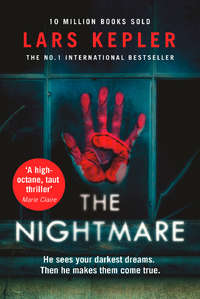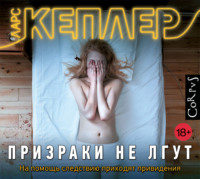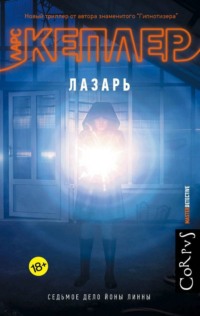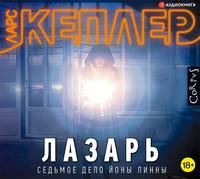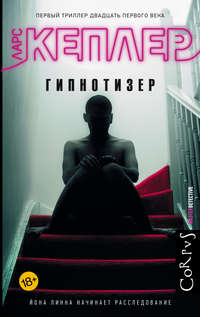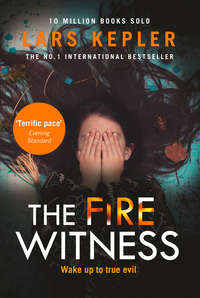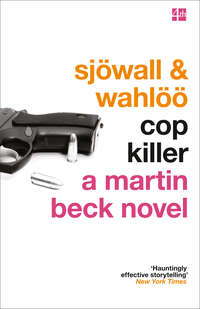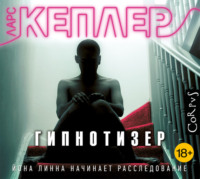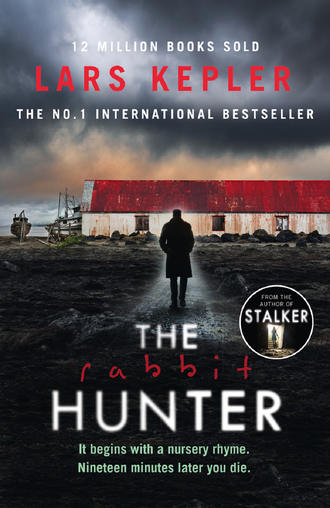
Полная версия
The Rabbit Hunter
Joona turns his back on the newcomer with the knife. As he exchanges a few words with Marko, he can see the man’s reflection in the window looking onto the yard.
‘I could have killed the cop,’ the man says, breathing hard through his thin nose.
‘No, you couldn’t,’ Marko replies over Joona’s shoulder.
15
Twenty-three months have passed since Joona was found guilty of using violence to help a convicted felon escape custody. He was taken away to the risk assessment unit at Kumla Prison.
The prison service transportation unit took his few possessions, custody documents and ID. Joona was led into the reception centre, where he was stripped, made to give a urine sample for a drug test, and given new clothes, sheets and a toothbrush.
After five weeks of evaluation he was placed in Unit T instead of the secure unit in Saltvik where convicted police officers are usually sent. He would spend the next few years in a cell measuring six square metres, with a plastic floor, a sink and a small, barred Plexiglas window.
For the first eight months Joona worked in the laundry with the rest of the inmates. He got to know a lot of the men on the second floor, and told each of them about his work with the National Police and his conviction. He knew it would be impossible to keep his past a secret. Whenever a new prisoner arrives in the unit, the others are quick to ask a relative on the outside to find out what they were sentenced for.
He has a relaxed relationship with most of the groups in the unit, but keeps his distance from the Brotherhood and its leader, Reiner Kronlid. The Brotherhood has links to extreme right-wing groups, and is involved in drug-trafficking and protection rackets in all the big prisons.
By the end of the summer Joona had encouraged nineteen prisoners to start studying, at various levels. They formed a support group, and so far only two of them have dropped out.
The monotonous routines make the whole establishment run very slowly. All the cell doors are opened at eight o’clock in the morning and locked at eight o’clock in the evening.
As soon as the automatic lock clicks open each morning, Joona leaves his cell to shower and have breakfast before the entire unit heads down into the ice-cold tunnels that link the different parts of the prison like a sewage system.
The men pass the junction where the commissary used to be before it was shut down. They wait for the doors to open, allowing them further along the tunnel.
The guys from Malmö run their fingertips superstitiously over the mural of Zlatan Ibrahimovic´ before heading to the powder-coating workshop.
The study group head for the library instead. Joona is halfway through a course in horticulture, and Marko has finally got his GCSEs. His chin trembled when he said he was thinking of studying science.
This could have been yet another identical day in prison. But it won’t be for Joona, because his life is about to take an unexpected turn.
Joona sets the table in the visitors’ room with coffee cups and saucers, smooths the tablecloth that he’s spread out, and switches on the coffee-maker in the little kitchen.
When he hears keys rattling outside the door he stands up and feels his heart beat faster.
Valeria is wearing a navy-blue blouse with white polka dots, and black jeans. Her dark-brown hair is tied back and hangs in soft coils.
She comes in, stops in front of him and looks up.
The door closes and the lock clicks.
They stand and look at each other for a long time before whispering hello.
‘It still feels so strange every time I see you,’ Valeria says shyly.
She looks at Joona with sparkling eyes, taking in the slippers with the prison service logo, the grey-blue T-shirt with sand-coloured sleeves, the worn knees of the baggy trousers.
‘I can’t offer much,’ he says. ‘Just sandwich biscuits and coffee.’
‘Sandwich biscuits,’ she nods, and pulls her trousers up slightly before sitting down on one of the chairs.
‘They’re not bad,’ he says, and smiles in a way that makes the dimples in his cheeks deepen.
‘How can anyone be so cute?’
‘It’s just these clothes,’ Joona jokes.
‘Of course,’ she laughs.
‘Thanks for your letter. I got it yesterday,’ he says, sitting down on the other side of the table.
‘Sorry if I was a bit forward,’ she mumbles, and blushes.
Joona smiles, and she does the same as she looks down, before raising her eyes again.
‘Speaking of which, it’s a shame they turned down your application for leave,’ Valeria says, suppressing another smile in a way that makes her chin wrinkle.
‘I’ll try again in three months … I can always apply for re-acclimatisation leave,’ Joona says.
‘It’ll be OK,’ she nods, feeling for his hand across the table.
‘I spoke to Lumi yesterday,’ he goes on. ‘She’d just finished reading Crime and Punishment in French … It was good, we just talked about books, and I forgot I was here … until the line went dead.’
‘I don’t remember you talking this much before.’
‘If you spread it out over two weeks, it’s only a couple of words an hour.’
A lock of hair falls across her cheek and she tosses her head to move it. Her skin is like brass, and she has deep laugh-lines at the corners of her eyes. The thin skin beneath her eyes is grey, and she has traces of dirt under her short nails.
‘You used to be able to order pastries from a bakery outside,’ Joona says, pouring coffee.
‘I need to start thinking about my figure for when you get out,’ she replies, with one hand on her stomach.
‘You’re more beautiful than ever,’ Joona says.
‘You should have seen me yesterday,’ she laughs, her long fingers touching an enamel daisy hanging from a chain around her neck. ‘I was out at the open-air pool in Saltsjöbaden, crawling around in the rain preparing the beds.’
‘Yoshino cherry trees, right?’
‘I picked a variety with white flowers, thousands of them. They’re amazing … every year in May it looks like a snowstorm has hit just those little trees.’
Joona looks at the cups and the pale blue napkins. The light from outside is falling in broad stripes across the table.
‘How are your studies going?’ she asks.
‘It’s exciting.’
‘Does it feel weird to be training for something new?’ she asks, folding her napkin.
‘Yes, but in a good way.’
‘You’re still sure you don’t want to go back to police work?’
He nods and looks over towards the window. The dirty glass is visible between the horizontal bars. His chair creaks as he leans back, disappearing into the memory of his last night in Nattavaara.
‘What are you thinking?’ she asks in a serious voice.
‘Nothing,’ he replies quietly.
‘You’re thinking about Summa,’ she says simply.
‘No.’
‘Because of what I said about a snowstorm.’
He looks into her amber-coloured eyes and nods. She has the peculiar ability to almost read his mind.
‘There’s nothing as quiet as snow after the wind has dropped,’ he says. ‘You know … Lumi and I sat with her, holding her hands …’
Joona thinks back to the strange calmness that settled on his wife before she died, and the absolute silence that followed.
Valeria leans across the table and puts her hand to his cheek without saying anything. He can see the tattoo on her right shoulder through the thin fabric of her blouse.
‘We’re going to get through this – aren’t we?’ she asks quietly.
‘We’re going to get through this,’ he nods.
‘You’re not going to break my heart, are you, Joona?’
‘No.’
16
Joona feels a lingering joy after Valeria has left. It’s as if she brings him a small portion of life every time she visits.
He has almost no space in his cell, but if he stands between the desk and the sink he has just enough room to do some shadow-boxing and hone his military fighting techniques. He moves slowly and systematically, thinking of the endless flatlands in the Netherlands where he received his training.
Joona doesn’t know how long he’s been practising, but the sky is so dark that the yellow wall that encloses the prison is no longer visible through the barred window when the lock clicks and the cell door opens.
Two guards he hasn’t seen before are standing in the doorway, looking at him rather anxiously.
He thinks it must be a search. Something’s happened, maybe an attempted escape that they suspect he’s involved in.
‘You’re going to see a defence lawyer,’ one of the guards says.
‘What for?’
Without answering they cuff his hands and lead him out of the cell.
‘I haven’t requested a meeting,’ Joona says.
They walk down the stairs together and on down the long hallway. A prison guard passes them silently and disappears.
Joona wonders if they’ve realised that Valeria has been using her sister’s ID when she visits him. She has a criminal record of her own, and wouldn’t be allowed to see him if she used her own name.
The colour and style of the pictures along the walls change. The harsh lighting shows up the shabbiness of the concrete floor.
The guards lead Joona through security doors and airlocks. They have to show the warrant authorising the transfer several times. More locks whirr, and they head deeper into a section Joona isn’t familiar with. At the far end of the hallway two men are standing guard outside a door.
Joona immediately recognises that they’re Security Police officers. Without looking at him they open the door.
The dimly lit room is completely bare apart from two plastic chairs. Someone is sitting in one of them.
Joona stops in the middle of the floor.
The light from the low-hanging ceiling lamp doesn’t reach the man’s face. It stops at the pressed creases of his trousers and the black shoes, wet mud visible beneath their soles.
Something is glinting in his right hand.
When the door closes behind Joona the man stands up, takes a step forward into the light and tucks his reading glasses in his breast pocket.
Only then does Joona see his face.
It’s Sweden’s Prime Minister.
His eyes are cast in darkness, and the shadow of his sharp nose lies like a stroke of black ink across his mouth.
‘This meeting has never taken place,’ the Prime Minister says in his characteristic hoarse voice. ‘I haven’t met you, and you haven’t met me. No matter what happens you’ll tell people you had a meeting with your defence lawyer.’
‘Your driver doesn’t smoke,’ Joona says.
‘No,’ he replies in surprise.
The Prime Minister’s right hand moves aimlessly towards the knot of his tie before he continues.
‘Last night my government’s Foreign Minister was murdered in his home. The official story is that he died after a short illness, but we’re actually dealing with an act of terrorism.’
The Prime Minister’s nose is shiny with sweat, and the bags under his eyes are dark. The leather bracelet carrying the emergency alarm slips down his wrist as he pulls the other plastic chair forward for Joona.
‘Joona Linna,’ he says. ‘I’m going to make you a highly unorthodox offer, an offer that is only valid here and now.’
‘I’m listening.’
‘An inmate from Hall Prison is going to be transferred and placed in your unit. His name is Salim Ratjen. He was convicted of drug offences, but found not guilty of murder … The evidence suggests that he occupies a central position in a terrorist organisation, and that he may even be directing whoever carried out the murder of the Foreign Minister.’
‘Background information?’
‘Here,’ the Prime Minister replies, handing over a thin folder.
Joona sits down on the chair and takes the file with his cuffed hands. The plastic creaks as he leans back. As he reads he notices that the Prime Minister keeps checking his phone.
Joona skims the report from the crime scene, the lab results and the interview with the female witness in which she says she heard the killer say that Ratjen had opened the door to hell. The report concludes with graphs of telecom traffic and Sheikh Ayad al-Jahiz’s command that western leaders should be tracked down and their faces blown off.
‘There are plenty of holes,’ Joona says, handing the folder back.
‘This is just a preliminary report. A lot of test results are still missing, and—’
‘Holes that were left on purpose,’ Joona interrupts.
‘I don’t know anything about that,’ the Prime Minister says, slipping his phone back in the inside pocket of his jacket.
‘Have there been any other victims?’
‘No.’
‘Is there anything to suggest that more attacks are planned?’
‘I don’t think so.’
‘Why the Foreign Minister?’ Joona asks.
‘He was pushing for coordinated European action against terrorism.’
‘What do they achieve by killing him?’
‘This is a clear attack against the very heart of democracy,’ the Prime Minister goes on. ‘And I want the heads of these terrorists on a fucking plate, if you’ll pardon the expression. This is about justice, about putting our foot down. They cannot and will not frighten us. That’s why I’m here, to ask if you’re prepared to infiltrate Salim Ratjen’s organisation from inside prison.’
‘I assumed that. I appreciate your faith in me, but you have to understand that I’ve built up a life in here. It wasn’t easy, because people are aware of my background, but over time they’ve learned that they can trust me.’
‘We’re talking about national security here.’
‘I’m no longer a police officer.’
‘The Security Police will have your conviction quashed and you’ll get conditional parole if you do this.’
‘I’m not interested.’
‘That’s how she said you’d react,’ the Prime Minister says.
‘Saga Bauer?’
‘She said you wouldn’t listen to any offer from the Security Police … That’s why I decided to come in person.’
‘I’d be more inclined to consider the job if I didn’t think you were withholding vital information from me.’
‘What is there to conceal? The Security Police think you can help them identify Salim Ratjen’s contact on the outside.’
‘I’m sorry you wasted your time,’ Joona says, then gets to his feet and starts walking towards the door.
‘I can get you pardoned,’ the Prime Minister says to his back.
‘That would require government approval,’ Joona says, turning around.
‘I’m the Prime Minister.’
‘As long as I feel I’m not being given all available information, I’m going to have to say no,’ Joona repeats.
‘How can you claim to be unaware of what you don’t know?’ the Prime Minister asks, obviously irritated.
‘I know you’re sitting here even though you should be in Brussels for a meeting of the European Council,’ Joona says. ‘I know that you gave up smoking eight years ago, but now you’ve suffered a relapse, judging by the smell on your clothes and the mud on your shoes.’
‘Mud on my shoes?’
‘You’re a considerate man, and because your driver doesn’t smoke you got out of the car to have a cigarette.’
‘But …’
‘I’ve noticed you checked your phone eleven times, but you haven’t answered any messages, so I know there’s something missing, because there was nothing in that report I read that indicates there’s any real urgency.’
For the first time, the Prime Minister looks lost for words. He rubs his chin and seems to be thinking hard.
‘We believe we’re dealing with a number of planned murders,’ he says eventually.
‘A number?’ Joona repeats.
‘The Security Police removed that from the report, but there seem to be three murders planned, at least to start, and the next one is believed to be planned for Wednesday. That’s why it’s urgent.’
‘Who are the likely targets for these attacks?’
‘We don’t know for sure, but the information we do have suggests precise and well-planned executions.’
‘Politicians?’
‘Probably.’
‘And you think one of them might be you?’ Joona asks.
‘It could be anyone,’ the Prime Minister replies quickly. ‘But I’ve been led to believe that you’re our best option, and I’m hoping you’ll accept the job. And if you do actually manage to discover information that helps stop these terrorists, I’ll see to it that you get your old life back.’
‘You can’t do that,’ Joona replies.
‘Listen, you have to do this,’ the Prime Minister says. Joona can tell that he’s really scared.
‘If you can get the Security Police to cooperate fully with me, then I promise to identify the people responsible.’
‘And you understand that it has to happen before Wednesday …? That’s when they kill their next target,’ the Prime Minister says.
17
The Rabbit Hunter is walking restlessly around the large shipping container in the crooked glare of the fluorescent ceiling light.
He stops in front of a few open crates and a large petrol can. He presses his fingers to his left temple and tries to calm his breathing.
He looks at his phone.
No messages.
As he walks back to his equipment he steps on a laminated map of Djursholm lying on the floor.
He’s put his pistols, knives and rifles in a pile on a battered desk. Some of the weapons are dirty and worn, while others are still in their original packaging.
There’s a pile of rusty tools and old mason jars full of springs and firing pins, extra cartridges, rolls of black bin bags, duct-tape, bags of zip ties, axes and a broad-bladed Emerson knife, its tip honed as sharp as an arrowhead.
He’s stacked boxes containing different types of ammunition against the wall. On top of three of them are photographs of three people.
A lot of the boxes are still closed, but the lid has been torn off one box of 5.56x45mm ammunition, and there are bloody fingerprints on another.
The Rabbit Hunter puts a box of 9mm pistol bullets in a crumpled plastic bag. He examines a short-handled axe and adds it to the bag, then drops the whole thing on the floor with a loud clang.
He reaches out his hand and picks up one of the small photographs. He moves it to the edge of one of the container’s metal ribs, but it falls off.
He puts it back carefully and looks at the face with a smile: the cheery set of the mouth, the unruly hair. He leans forward and looks into the man’s eyes, and decides that he’s going to cut his legs off and watch him crawl like a snail through his own blood.
And he’ll watch the man’s son’s desperate attempts to tie tourniquets around his father’s legs in an effort to save his life, and maybe he’ll let him stem the flow of blood before going over and slicing his stomach open.
The photograph falls again and sails down amongst the weapons.
He lets out a roar and overturns the entire desk, sending pistols, knives and ammunition clattering across the floor.
The glass jars shatter in a cascade of splinters and spare parts.
The Rabbit Hunter leans against the wall, gasping for breath. He remembers the old industrial area that used to be between the highway and the sewage plant. The printing works and warehouses had burned down, and beneath the foundations of an old cottage was a vast rabbit warren.
The first time he checked the trap, there were ten small rabbits in the snares, all exhausted but still alive when he skinned them.
He regains control of himself. He’s calm and focused again. He knows he can’t give in to his rage, can’t show its hideous face, not even when he’s alone.
It’s time to go.
He licks his lips, then picks a knife up off the floor, along with two pistols, a Springfield Operator and a grimy Glock 19. He adds another carton of ammunition and four extra magazines to the plastic bag.
The Rabbit Hunter goes out into the cool night air. He closes the door of the container, pulls the bar across it and fastens the padlock, then walks to the car through the tall weeds. When he opens the boot a cloud of flies emerges. He tosses the bag of weapons in beside the bin-bag of rotting flesh, closes the boot and turns towards the forest.
He looks at the tall trees, conjures up the face in the photograph, and tries to force the rhyme out of his head.
18
In the Salvation Army’s offices at 69 Östermalms Street, a private lunch meeting is underway. Twelve people have made one long table out of three smaller ones, and are now sitting so close that they can see the tiredness and sadness in each other’s faces. The daylight shines in on the pale wooden furniture and the tapestry of the apostles fishing.
At one end sits Rex Müller, in his tailored jacket and black leather trousers. He’s fifty-two years old, still good-looking despite his frown and the swollen bags under his eyes.
Everyone looks at him as he puts his coffee cup back down on the saucer and runs a hand through his hair.
‘My name is Rex, and I usually don’t say anything, I just sit and listen,’ he begins, then gives an awkward little smile. ‘I don’t really know what you want me to say.’
‘Tell us why you’re here,’ says a woman with sad wrinkles around her mouth.
‘I’m a pretty good chef,’ he goes on, and clears his throat. ‘And in my line of work you need to know about wine, beer, fortified wine, spirits, liqueurs and so on … I’m not an alcoholic. I maybe drink a little too much. I do stupid things sometimes, even though you shouldn’t believe everything the papers say.’
He pauses and peers at them with a smile, but they just wait for him to go on.
‘I’m here because my employer insisted, otherwise I’ll lose my job … and I like my job.’
Rex had been hoping for laughter, but they’re all looking at him in silence.
‘I have a son. He’s practically grown up now, in his last year at high school … And one of the things I probably ought to regret about my life is not being a good dad. I haven’t been a dad at all. I’ve been there for birthdays and so on, but … I didn’t really want children, I wasn’t mature enough to …’
His voice cracks in the middle of the sentence, and to his surprise he feels tears welling up in his eyes.
‘OK, I’m an idiot, you might have realised that already,’ he says quietly, then takes a deep breath. ‘It’s like this … My ex, she’s wonderful, there aren’t many people who can say that about their ex, but Veronica is great … And now she’s been hand-picked to launch a big project about free healthcare in Sierra Leone, but she’s thinking of turning it down.’
Rex smiles wryly at the others.
‘She’s perfect for the job … so I told her I was trying to stay sober these days, and that Sammy can live with me when she’s away. Since I’ve been coming to these meetings she believes I’ve started to show more responsibility … and now she’s actually going on her first trip to Freetown.’
He runs his fingers through his messy black hair and leans forward.
‘Sammy’s had a pretty tough time. It’s probably my fault, I don’t know, his life is very different to mine … I’m not for a minute thinking I can repair our relationship, but I am actually looking forward to getting to know him a little better.’
‘Thanks for sharing,’ one of the women says quietly.
Rex Müller has spent the past two years as the resident chef on a popular morning programme on TV4. He’s won silver in the Bocuse d’Or contest, has worked with Magnus Nilsson at Fäviken Magasinet, has published three cookbooks, and last autumn he signed a lucrative contract with the Grupp F12 restaurant company, making him head chef at Smak.
After three hours in the new restaurant he hands things over to Eliza, the sous chef, changes into a blue shirt and suit, and heads over to the inauguration of a new hotel at Hötorget. He gets photographed with Avicii, then takes a taxi out to Dalarö to meet his associates.


